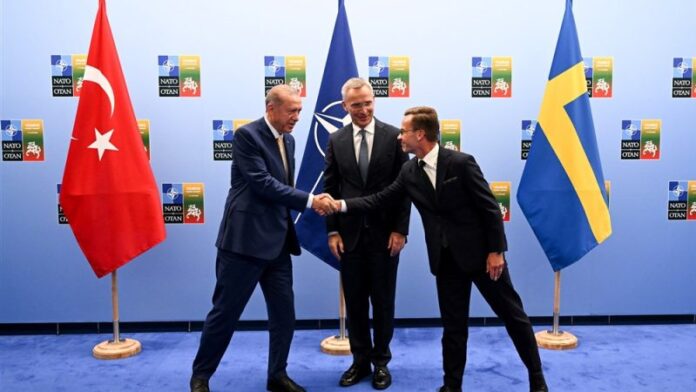Turkey’s President Recep Tayyip Erdoğan dropped his resistance to Sweden joining the alliance late Monday evening, on the eve of a landmark NATO summit in Vilnius which is set to discuss Ukraine’s own push for membership, according to Euractiv.
Erdoğan’s last-minute change of position came after an eleventh-hour meeting with Swedish Prime Minister Ulf Kristersson and NATO Seceretary-General Jens Stoltenberg.
“I’m glad to announce that President Erdoğan has agreed to forward the accession protocol for Sweden to the grand national assembly as soon as possible and work closely with the assembly to ensure ratification,” Stoltenberg told reporters in Vilnius.
“Completing Sweden’s accession to NATO is a historic step that benefits the security of all NATO allies at this critical time. It makes us all stronger and safer,” he said.
Stoltenberg said Erdoğan had made a “clear commitment” to move on to Sweden’s accession. Kristersson said he was “very happy” and hailed “a good day for Sweden”.
The step follows over a year of wrangling to get Turkey and Hungary to ratify, admitting Sweden and Finland into the Western military alliance after both traditionally military-neutral countries ditched their position after Russia’s war on Ukraine.
While Finland became NATO’s 31st member in April, Ankara has been holding up Sweden’s NATO application, accusing Stockholm of harbouring Kurdish activists Ankara regards as terrorists.
Earlier in the day on Monday, Erdoğan had upped the stakes by demanding that the EU revive Turkey’s stalled EU membership bid as a precondition for unblocking Sweden’s bid to join NATO.
In a statement after the three-way talks between Erdoğan, Kristersson and Stoltenberg, Sweden vowed to boost anti-terrorism coordination and bilateral trade.
Sweden and NATO underlined that Stockholm had changed laws, expanded counter-terrorism cooperation against the Kurdistan Workers’ Party (PKK) and restarted arms exports to Turkey.
In their joint statement, Turkey and Sweden also agreed to create a “new bilateral Security Compact” and that Stockholm will present a “roadmap as the basis of its continued fight against terrorism in all its forms.”
As part of the deal, Stoltenberg has also agreed to create a new post of “Special Coordinator for Counter-Terrorism” at NATO, but it reminded unclear what powers the position would entail in practice.
The move would also show that terrorism still holds the rank of a ‘threat’ to the military alliance, the only other one categorized as such alongside Russia, they added, especially after Russia’s war on Ukraine has sent the fight against terrorism to the back burner in the past two years.
Erdoğan paused his talks with Stoltenberg and Kristersson for a sideline meeting with European Council President Charles Michel, who hailed the talks as a “good meeting” that had “explored opportunities ahead to bring EU-Turkey cooperation back to the forefront and re-energise our relations”.
“Sweden will actively support efforts to reinvigorate Türkiye’s EU accession process, including modernisation of the EU-Türkiye Customs Union and visa liberalisation,” the statement said.
While Turkey has been an EU candidate since 1999, Turkey’s bid to join the EU has been frozen for years after membership talks were launched in 2005 with little prospect of continuation.
Monday’s statements imply Ankara and Brussels may move on boosting trade, updating their customs agreements and loosening visa rules in the absence of formal membership talks.
Most EU member states remain highly sceptical of Turkey’s commitment to democratic and rule of law reforms, and Germany’s Olaf Scholz insisted Sweden and Turkey’s ambitions are not linked.
According to Monday’s agreement, the next step is that Ankara “will transmit the Accession Protocol for Sweden to the Grand National Assembly and work closely with the Assembly to ensure ratification.”
Hungary is yet to greenlight Stockholm’s bid, but Prime Minister Viktor Orbán has signalled he will follow Erdoğan’s lead, with the Hungarian parliament expected to vote on the matter after the summer break.
NATO leaders on Tuesday as expected to drop the requirement that Ukraine completes a so-called “Membership Action Plan”, a road map to military reform that some members have had to follow when making their bid to join the military alliance, according to several Western officials.
The Kremlin has been angered by the expected solidarity with Ukraine at the NATO summit, which starts on Tuesday, saying Kyiv’s potential alliance membership would threaten Russia and Moscow would react accordingly.


